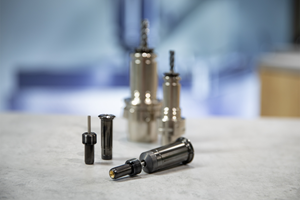Alcohol-Based Coolant Offers Environmentally Friendly Machining
This micro-volume coolant delivery system uses ethanol as the cooling medium for non-ferrous workpieces. The ethanol evaporates after it cools the cutting tool, so no residue is left behind on machined workpieces.
Share




Hwacheon Machinery America, Inc.
Featured Content
View More.png;maxWidth=45)
DMG MORI - Cincinnati
Featured Content
View More
Autodesk, Inc.
Featured Content
View More

Takumi USA
Featured Content
View MoreEthanol may soon play a bigger role not only in the way future vehicles are powered, but also how micro tools are cooled during high speed machining (HSM) operations. Datron Dynamics (Milford, New Hampshire) has developed a micro-volume coolant delivery system for its high speed VMCs that uses ethanol as the cooling medium. The ethanol evaporates after it cools the cutting tool, so no residue is left behind on the machined workpiece. This alternate coolant technique eliminates the recycling and disposal issues inherent to petroleum-based coolants, and it makes secondary workpiece degreasing unnecessary. Ethanol’s low viscosity allows it to reach the tool tip for effective cooling and lubrication at high spindle rpms, which may not be possible using emulsion-based coolants.
Ethanol is a naturally occurring form of alcohol with a low evaporation temperature. Though flammable, it is safe for use with workpiece materials that will not spark or develop an unusually high amount of heat during the machining process. Suitable materials include non-ferrous metals such as aluminum, copper, magnesium and brass, as well as a variety of plastics (excluding some polycarbonates whose crystalline matrix may be damaged by the ethanol). It is obviously not appropriate for machining ferrous materials, because the sparks generated as a carbide tool cuts such material could ignite the ethanol. In addition, ferrous materials should not be used for workpiece fixturing, in case a cutting tool inadvertently contacts the fixture as a result of a programming or operator error. The fumes that are generated as the ethanol evaporates are removed via a fan located within the machine enclosure. Optional fire suppression equipment is available.
An effective coolant delivery system is important to reduce cutting temperatures during HSM operations. It is also necessary to provide proper lubricity to allow a tool to move swiftly across the surface of a workpiece, notes Dr. Walter Schnecker, Datron Dynamics’ president. “Micro tools require a lubricating agent with a lower viscosity than water to ensure that the coolant reaches the cutting edge of the tool at the high spindle speeds,” Dr. Schnecker explains. “Ethanol is thinner than water and runs quickly to a tool’s cutting edge. Emulsion-based coolants, which typically have a higher viscosity than water, are therefore not as effective in lubricating micro tools during HSM operations.”
The coolant delivery system consists of an ethanol reservoir and two delivery nozzles. The ethanol is sprayed on the tool and the surrounding workpiece surface in a fine mist—micro tooling does not need a significant volume of coolant. The maximum output of the system is 25 mL/min., which translates to a consumption rate of 0.4 gallons of ethanol per hour. Dr. Schnecker estimates that most users typically consume approximately 1 gallon of ethanol per machine per day. “Recycling an oil-based coolant can cost as much as $12,000 per machine per year; recycling emulsion-based coolant can range from $2,000 to $4,000 per machine per year,” he notes. “The annual cost for the ethanol is less than those costs.”
Datron Dynamics also offers a micro volume, vegetable oil-based coolant system for machining ferrous materials. The machine’s controller allows users to switch between ethanol and vegetable oil for machines that will process both non-ferrous and ferrous workpieces.
Related Content
Henkel Redefines Industrial Machining and Grinding with Sustainable Metalworking Innovation
With innovative formulation and bio-resistant properties, Henkel’s new semi-synthetic lubricant emerges as a pioneering solution in the machining industry.
Read MoreSustainability Project Cuts Costs for Growing Manufacturer
A custom coolant and chip management system has helped Youngers and Sons lower its supply costs, improve its recycling margins and maintain a clean shop floor.
Read MoreRego-Fix Toolholding System Reduces Coolant Consumption
MQL PG collets are designed for machines using one-channel, internal through-spindle MQL systems.
Read MoreSTLE To Host Metalworking Fluid Management Program
STLE’s program is a two-and-a-half-day education program offering a comprehensive overview of metalworking fluid management.
Read MoreRead Next
5 Rules of Thumb for Buying CNC Machine Tools
Use these tips to carefully plan your machine tool purchases and to avoid regretting your decision later.
Read MoreRegistration Now Open for the Precision Machining Technology Show (PMTS) 2025
The precision machining industry’s premier event returns to Cleveland, OH, April 1-3.
Read MoreBuilding Out a Foundation for Student Machinists
Autodesk and Haas have teamed up to produce an introductory course for students that covers the basics of CAD, CAM and CNC while providing them with a portfolio part.
Read More













































